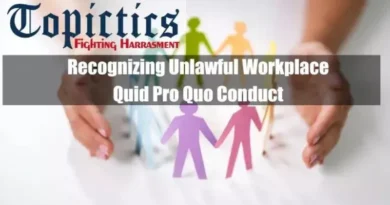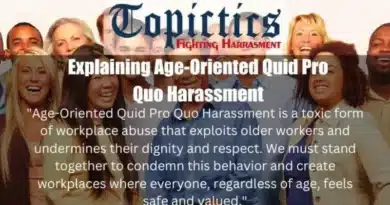Key Takeaways:
- Quid Pro Quo Harassment Defined: Quid pro quo harassment involves someone in a position of power conditioning a benefit, like a promotion, on unwelcome advances, which is illegal under federal law.
- Legal Implications for the Victim:
- Hostile Work Environment: Quid pro quo harassment can create a hostile work environment for the victim, interfering with their work performance.
- Retaliation: Victims may face retaliation from their employer or the harasser for reporting harassment.
- Constructive Discharge: Intolerable working conditions due to harassment can lead to constructive discharge.
- Punitive Damages: Courts may award punitive damages to punish the perpetrator.
- Financial Strain: Victims may suffer economic hardships such as job loss and reduced pay.
- Loss of Professional Opportunities: Harassment can damage the victim’s reputation and hinder career advancement.
- Impact on Mental and Physical Health: Victims may experience anxiety, depression, and other health issues.
- Social Withdrawal: Victims may withdraw from social activities due to shame or embarrassment.
- Legal Implications for the Perpetrator:
- Discipline from Employer: Employers must prevent and address harassment, potentially leading to disciplinary action against the perpetrator.
- Civil Lawsuit: Victims can file civil lawsuits against the perpetrator, seeking damages.
- Criminal Charges: Perpetrators may face criminal charges, especially if force or coercion is involved.
- Reputational Damage: Perpetrators may suffer reputational harm, making finding employment or maintaining relationships difficult.
- Professional Consequences: Perpetrators may face career setbacks, including finding employment and personal guilt.
- Workplace Quid Pro Quo Harassment: Quid pro quo harassment can occur in any workplace but is more common in environments with power imbalances.
- Legal Consequences: Employers can be held liable for their employees’ actions, and victims have legal recourse through reporting, suing for damages, and pursuing criminal charges against perpetrators.
- Employee Rights and Protections: Employees have rights to a harassment-free workplace, to report harassment without fear of retaliation, and to seek legal action.
- Quid Pro Quo Harassment Protections: Laws like Title VII of the Civil Rights Act protect employees from quid pro quo harassment.
- Legal Recourse: Victims have options such as filing complaints with the EEOC, suing for damages, and pursuing criminal complaints against perpetrators.
- Nondiscrimination Laws: Workplace nondiscrimination laws prohibit harassment based on protected characteristics, including sex, race, religion, and others.
Quid pro quo harassment is illegal, and it occurs when someone in a position of power conditions a benefit (like a promotion) on unwelcome advances. The victim can sue for damages like lost wages and emotional distress, and the employer may be liable if they knew or should have known about the abuse.
I. What is Quid Pro Quo Harassment?
Quid pro quo harassment is a type of sexual harassment that occurs when someone in a position of power offers or demands sexual favors in exchange for something, such as a promotion, raise, good grades, or continued employment. It is illegal under federal law, and victims may be entitled to damages.
“Quid pro quo harassment is a violation of our basic human rights. It is an abuse of power that can have devastating consequences for the victim.”
Topictics
II. The 13 Legal Implications of Quid Pro Quo Harassment
Quid pro quo harassment is a serious offense that can have significant legal implications for both the victim and the perpetrator.
A. The Legal Implications of Quid Pro Quo Harassment For the Victim
The legal implications of quid pro quo harassment for the victim can be significant. Victims may experience psychological distress, anxiety, and depression. They may also experience economic hardship, such as lost wages or job opportunities. In some cases, victims of quid pro quo harassment may be able to file a lawsuit against their employer or the harasser. If successful, they may be awarded damages, including lost wages, back pay, and emotional distress.
Here are some of the specific legal implications of quid pro quo harassment for the victim:
1. Hostile work environment
Quid pro quo harassment can create a hostile work environment for the victim. A hostile work environment is one in which the victim is subjected to unwelcome sexual harassment that is so severe or pervasive that it unreasonably interferes with their work performance or creates an intimidating, hostile, or offensive work environment.
2. Retaliation

Victims of quid pro quo harassment may also experience retaliation from their employer or the harasser. Retaliation is any adverse action taken against an employee because they have reported sexual harassment or have participated in an investigation into sexual harassment. Retaliation can include being fired, demoted, or subjected to other adverse employment actions.
3. Constructive Discharge
A constructive discharge occurs when an employee is forced to quit because of intolerable working conditions. Quid pro quo harassment can create intolerable working conditions, which could lead to a constructive discharge. Suppose a victim of quid pro quo harassment is constructively discharged. In that case, they may be able to file a lawsuit against their employer.
- Also, read Explaining Non-Sexual Quid Pro Quo Harassment.
- Also, read 20 Quid Pro Quo Harassment Examples and How to Stop Them.
4. Punitive Damages
In some cases, courts may award punitive damages in addition to compensatory damages. Punitive damages are intended to punish the perpetrator and deter similar behavior from them or others.
Victims of quid pro quo harassment may be able to recover damages in a lawsuit against their employer or the harasser. Damages include lost wages, back pay, emotional distress, and punitive damages.
5. Financial Strain
Financial hardships are a major concern for victims of quid pro quo harassment. Victims may experience job loss, demotions, reduced pay, or other negative employment actions due to the harassment. This can lead to financial difficulties, such as difficulty paying bills, affording housing, or providing for their family.
6. Loss of Professional Opportunities

Quid pro quo harassment can damage a victim’s reputation and make it difficult to find a new job or advance their career.
- Also, read How to Prevent Quid Pro Quo Harassment: 20 Effective Ways.
- Also, read 20 Ways to Prevent Quid Pro Quo Harassment Under Title IX.
7. Impact on Mental and Physical Health
Quid pro quo harassment can cause various mental and physical health problems, such as anxiety, depression, post-traumatic stress disorder (PTSD), and insomnia. These health problems can impact the victim’s ability to work, maintain relationships, and enjoy life.
8. Social Withdrawal
Victims of quid pro quo harassment may feel ashamed or embarrassed and withdraw from social activities and relationships. This can lead to social isolation and loneliness.
“Victims of quid pro quo harassment deserve justice. They deserve to be compensated for their damages, and they deserve to know that their harasser will be held accountable.”
Topictics
- Also, read How to Create an Anti-Harassment Policy: 9 Effective Steps.
- Also, read How to Create an Effective Anti-Harassment Policy Under Title IX.
B. The Legal Implications of Quid Pro Quo Harassment For the Perpetrator
The legal implications of quid pro quo harassment for the perpetrator can be severe.
9. Discipline from Employer
Employers are required to take steps to prevent quid pro quo harassment and to investigate and address allegations of quid pro quo harassment promptly and thoroughly. If an employer fails to do so, they may be held liable for the actions of their employees. This means that the perpetrator of quid pro quo harassment may face disciplinary action from their employer, including suspension, demotion, or termination of employment.
10. Civil Lawsuit

Victims of quid pro quo harassment may file a civil lawsuit against the perpetrator. If successful, the victim may be awarded damages, including lost wages, back pay, emotional distress, and punitive damages.
11. Criminal Charges
In some cases, perpetrators of quid pro quo harassment may also face criminal charges. For example, if the perpetrator uses force or threats to coerce the victim into sexual favors, they may be charged with sexual assault or coercion.
Even if the perpetrator is not disciplined by their employer or charged with a crime, they may still face other negative consequences due to their actions. For example, they may be ostracized by their peers or have difficulty finding a new job if fired.
- Also, read Explaining Government Quid Pro Quo Harassment.
- Also, read How to Prove Quid Pro Quo Harassment: 13 Powerful Evidences.
12. Reputational Damage
Perpetrators of quid pro quo harassment may face significant reputational damage. Colleagues and peers may ostracize them, cause them to lose the respect of friends and family, and cause them to have difficulty finding new jobs.
- Perpetrators may be ostracized by their peers and colleagues.
- They may lose the respect of their friends and family members.
- They may have difficulty making new friends or finding a romantic partner.
- Their social life may need to be improved.
13. Professional Consequences
- Perpetrators may have difficulty finding a new job if they are fired.
- Certain employers may blacklist them.
- They may be unable to advance their careers.
- They may have to take a lower-paying job or a job in a less desirable field.
In addition to the social and professional consequences, perpetrators of quid pro quo harassment may also experience personal guilt and regret. They may realize the harm they have caused to the victim and others. They may also fear that their actions will be exposed and that they will be publicly humiliated.
Topictics
It is important to note that quid pro quo harassment is illegal even if the victim does not consent to the sexual favors. The mere fact that someone is in a position of power and offers or demands sexual favors in exchange for something is enough to constitute quid pro quo harassment.
If you are considering engaging in quid pro quo harassment, we urge you to reconsider. It is not worth the risk of facing the legal, social, professional, and personal consequences.
- Also, read Quid Pro Quo Harassment vs. Hostile Work Environment Harassment.
- Also, read Workplace Quid Pro Quo Harassment: An Ultimate Guide.
- Also, read Educational Quid Pro Quo Harassment: An Ultimate Guide.
III. Workplace Quid Pro Quo Harassment
Quid pro quo harassment may happen everywhere at work. Still, it is most common in workplaces with a power imbalance between employees and supervisors. For example, a supervisor may offer an employee a promotion in exchange for sexual favors, or a teacher may offer a student a good grade in exchange for sexual favors.
IV. Legal Consequences of Quid Pro Quo Harassment

Quid pro quo harassment is illegal under federal law, and employers are liable for the actions of their employees. This means that even if an employer was unaware of the harassment, they are generally liable unless they can prove they took reasonable steps to prevent harassment and address complaints
“The law is on the side of victims of quid pro quo harassment. There are laws to protect victims and hold their harassers accountable.”
13 Powerful Resources for Victims of Quid Pro Quo Harassment
Topictics
A. Legal consequences for employers
- Employers can be held liable for the actions of their employees, even if the employer was unaware of the harassment.
- Employers who fail to take steps to prevent or address quid pro quo harassment may be sued by victims of the harassment.
- Victims of quid pro quo harassment may be awarded damages, including lost wages, back pay, emotional distress damages, and punitive damages.
- Employers may also be ordered to prevent future harassment, such as training employees on sexual harassment and creating a more respectful work environment.
Also, read Is Quid Pro Quo Illegal? 21 Accused Celebrities Examples.
B. Legal consequences for perpetrators
- Victims of the harassment can sue perpetrators of quid pro quo harassment.
- Victims of quid pro quo harassment may be awarded damages, including lost wages, back pay, emotional distress damages, and punitive damages.
- Perpetrators of quid pro quo harassment may also face criminal charges, such as sexual assault or coercion.
V. Employee Rights and Protections
Employees have several rights and protections under the law regarding quid pro quo harassment. These rights include:
- The privilege of working in a sexually harassment-free environment
- The right to report sexual harassment without fear of retaliation
- To complain to the Equal Employment Opportunity Commission (EEOC)
- The right to sue their employer for damages
VI. Quid Pro Quo Harassment Protections

Several laws are in place to protect employees from quid pro quo harassment. These laws include:
- Title VII of the Civil Rights Act of 1964
- The Equal Employment Opportunity Act of 1972
- The Pregnancy Discrimination Act of 1978
- The Age Discrimination in Employment Act of 1967
- The Americans with Disabilities Act of 1990
Also, read Quid Pro Quo History Examples: A Complex Dance of Mutual Exchange.
VII. Legal Recourse for Quid Pro Quo Harassment
Employees victims of quid pro quo harassment have several legal options. These options include:
- Filing a complaint with the EEOC
- Suing their employer for damages
- Filing a criminal complaint against the perpetrator
VIII. Nondiscrimination Laws in the Workplace
Nondiscrimination laws in the workplace prohibit employers from discriminating against employees based on sex, race, religion, national origin, age, disability, or any other protected characteristic. This includes prohibiting quid pro quo harassment.
Also, read Explaining Quid Pro Quo Harassment Under Title IX.
Also, read Quid Pro Quo Harassment: What It Is and How to Respond.
IX. Conclusion
“You are strong. You are brave. You are worthy of respect.”
Topictics
Quid pro quo harassment is a serious offense with significant legal implications for both the victim and the perpetrator. Employees have many rights and protections under the law, and several legal options are available to victims of quid pro quo harassment.
X. FAQs
1. Can I file a quid pro quo harassment claim even if I did not consent to the sexual favors?
Yes. You do not need to consent to the sexual favors to file a quid pro quo harassment claim. The mere fact that someone in a position of power offered or demanded sexual favors in exchange for something is enough to constitute quid pro quo harassment.
2. How long do I have to file a quid pro quo harassment claim?
The time limit for filing a quid pro quo harassment claim varies depending on the state in which you live. However, you generally have 180 days to file a claim with the Equal Employment Opportunity Commission (EEOC). If you do not file a claim with the EEOC within 180 days, you may still be able to file a lawsuit in state court.
3. What are my rights if I am fired after reporting quid pro quo harassment?
If you are fired after reporting quid pro quo harassment, you may have a retaliation claim. Retaliation is illegal under federal law, and you may be entitled to damages if you can prove that you were retaliated against for reporting quid pro quo harassment.
4. Can I be held personally liable for quid pro quo harassment?
Yes. You can be held personally liable for quid pro quo harassment, even if your employer does not know about or condone the harassment. This means that you may be sued by victims of the harassment and ordered to pay damages.
5. What are the criminal consequences for perpetrators of quid pro quo harassment?
In some cases, perpetrators of quid pro quo harassment may face criminal charges. For example, if the perpetrator uses force or threats to coerce the victim into sexual favors, they may be charged with sexual assault or coercion.
6. Can I be sued for quid pro quo harassment even if the victim did not consent to the sexual favors?
Yes. You can be sued for quid pro quo harassment even if the victim did not consent to the sexual favors. The mere fact that you offered or demanded sexual favors in exchange for something is enough to constitute quid pro quo harassment.
7. Q: How can I protect myself from being accused of quid pro quo harassment?
Here are some tips to protect yourself from being accused of quid pro quo harassment:
- Be aware of your position of power and avoid using it to coerce or pressure others into sexual favors.
- Respect the boundaries of others and do not make unwanted sexual advances.
- Understand that consent is essential for any sexual activity.
- If you are unsure whether or not your behavior is appropriate, it is always best to err on the side of caution.









